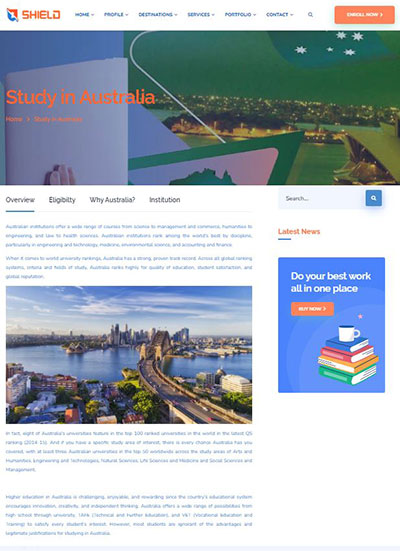Canada is situated in the northern half of North America, sharing its border with USA and covers 41% of the continent. However, due to the climatic conditions, around 4/5th of the entire Canadian population live in the urbanized area near the southern border. Canada has 10 Provinces and 3 territories and Toronto is the largest city in Canada. Canada has been continuously regarded by UN as the best country in the world to live and to study. The government system of Canada is Constitutional Monarchy. However, the prevailing British Monarch also serves as the Canadian Monarch and for Australia and New Zealand as well.
Academic Requirements
If you are applying for a student visa to Canada, you may have been thinking about requirements to study in Canada from Nepal. You can get ready for the procedure by looking at the prerequisites. Like this, Canadian Universities have established a unique application process that varies from university to university.
Most colleges and universities, as well as Canadian immigration, need you to have an overall IELTS score of 6.5 or higher, with a minimum band score of 6.0 or the equivalent on another English proficiency test. Whereas the Canadian High Commission and Canadian educational institutions prefer the ILETS test, and you need to have a minimum GPA of 55%. You must demonstrate sufficient financial stability to pay for the costs of living and attending school in Canada. A gap should not be an issue if you have legitimate professional obligations in your study area.
IELTS Requirements
To study in Canada, you will need to prove you have the language skills to be successful in your program. You will need to provide results from an English or French language test. The most common test used to demonstrate language proficiency is the IELTS.
The IELTS test is offered in over 150 locations worldwide and is accepted by over 9,000 institutions in over 135 countries. The test measures your ability to communicate in English in academic contexts. It has four sections: listening, reading, writing, and speaking.
You will need to achieve a score of 6.5 or higher on the IELTS test to be eligible to study in Canada. Few universities, like the University of Toronto and the University of Waterloo, need an IELTS score of 7.0. For Masters and PG Diploma/ Grad Certificate: Minimum 6.5 in IELTS with no band less than 6 (PTE above 62, TOEFL 88 with no band less than 20).
IELTS minimum of 6.5 for bachelor's degrees, with no band lower than six. (TOEFL 88 each band no less than 20) PTE (60-63) no band less than 55
For diplomas, advanced diplomas, associate degrees, and certificates, the minimum overall IELTS score is six, with no band lower than six, and the preferred score is 6.5.
1. Academic Excellence
The high caliber of education is among the main factors influencing students' decision to study in Canada and graduate. A student's degree from a Canadian university serves as a symbol of distinction and reliability.
2. Numerous prospects for research
The high emphasis on research and development in Canadian education is one of the main factors that sets it apart from other systems. There is no better country than Canada if you are a researcher or researcher. Research in medical, telecommunication, agriculture, environmental science, and technology is generously supported by the Canadian government. Canada is suitable for professional researchers as well.
3. Inexpensive and within your budget
When compared to institutions in the US and the UK, Canada's tuition is less expensive. And when you take the return on investment into account, it is a very sensible choice for international students. You can also apply for various Canadian scholarships to lower your tuition costs.
4. Diversity of cultures
People in Canada are amiable and inviting, hailing from various ethnic groups with unique customs and lifestyles. Canada's diversified climate fosters friendship and peaceful coexistence like no other nation. There are a lot of international students here, like India, Nepal, China, Indonesia, Philippines, etc., who are learning, working, and living. Festivals and rituals like the Calgary Stampede NHL Hockey Experience, the Montreal International Jazz Festival, Montreal's Just for Laughs comedy festival, etc.
5. Peaceful and secure environment
One of the top reasons why people choose to study in Canada is because it is a safe and secure place to live. The country has a low crime rate and is home to some of the world's best universities. One of the safest countries in the world has long been Canada.
The Global Peace Index* has ranked Canada as the 12th most peaceful nation in the world as of 2022. You will have the same rights as any other Canadian as an international student.
6. Get paid to study
Canada offers its international students the chance to work up to 20 hours per week during their semesters and full-time during the summer and winter breaks, thanks to its unique legislation. You would not need a separate work permit to work on campus or as an intern at any business because your study permit is sufficient to support your search for a part-time job.
7. An active and vibrant campus life
All Canadian campuses can anticipate ongoing events, festivals, and other activities. Indeed, this brings life and happiness to the classroom for all students, facilitates networking, and helps you meet new people while preventing homesickness.
8. Possibilities for immigration
The Post-Graduation Work Permit Program (PWPP) in Canada enables students to remain and find employment for up to three years following graduation. You may work abroad for a while and then seek permanent residency/residence or get citizenship.
Featured Programs
While Canada offers the entire range of programs at all levels, these are five top industries that have not only top-rated courses but also ample job opportunities:
- Hospitality industry
- Health Science
- Information Technology
- Engineering
- Business Management
Financial Aid and Scholarships
There are a range of scholarships and financial aid options available to students wishing to study in Canada. The following are some of the most common:
- Scholarships offered by the Canadian government
- Scholarships offered by universities and colleges in Canada
- Scholarships offered by private organizations
- Loans and bursaries offered by the Canadian government
The best way to find out about financial aid and scholarship options is to contact the universities or colleges you are interested in attending. There are a variety of financial aid and scholarship options available to students who want to study in Canada. The government of Canada offers a variety of scholarships and bursaries to international students, and many Canadian universities also offer scholarships and financial aid to international students. Additionally, there are a number of private scholarships available to students who want to study in Canada.
Government of Canada Scholarships and Bursaries
The government of Canada offers several scholarships and bursaries to international students who want to study in Canada. The following scholarships and bursaries are available to international students:
- The Canadian Merit Scholarship Program: This program offers scholarships to international students who have a high academic achievement and demonstrate strong leadership skills.
- The Canada Millennium Scholarship Program: This program offers scholarships to students who are from low-income families or have disabilities.
- The Canada Student Grant Program: This program offers grants to students who have a low income or are from a remote area.
- The Canada Study Grant Program: This program offers grants to students who are enrolled in a full-time degree program at a Canadian university or college.
- The Canada Education Savings Grant Program: This program offers grants to In Canadian Universities and Colleges, various merit-based and application-based scholarships and bursaries are offered.
| Rank | University |
| 31 | McGill University |
| 34 | University of Toronto |
| 47 | University of British Columbia |
| 110 | University of Alberta |
| 116 | Université de Montréal |
| 152 | McMaster University |
| 154 | University of Waterloo |
| 172 | Western University |
| 237 | University of Ottawa |
| 242 | University of Calgary |










